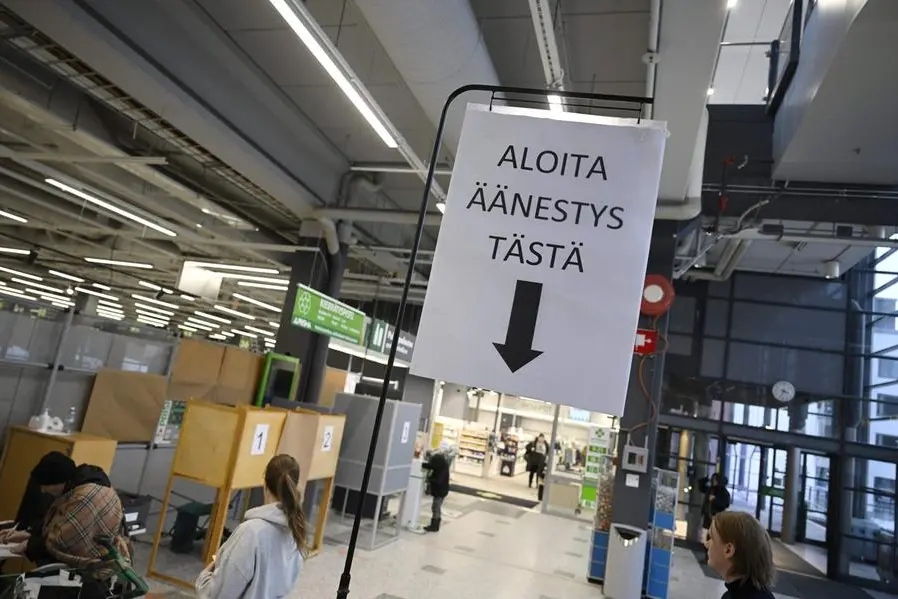PHOTO
Two seasoned politicians face off in Finland's presidential election on Sunday, taking place against the backdrop of rising tensions with neighbouring Russia and a changing geopolitical landscape in Europe.
Former conservative prime minister Alexander Stubb and ex-foreign minister Pekka Haavisto, a Green Party MP running as an independent, qualified for the run-off after a first round of voting in late January where they emerged first and second respectively.
A poll by daily Helsingin Sanomat published Monday credited Stubb with 54 percent and Haavisto with 46 percent.
As a new member of NATO, Finland's role in a changing Europe will be the main concern for the new head of state, who leads the country's foreign policy together with the government and also acts as supreme commander of the armed forces.
"Compared to previous elections, defence policy has been pretty central for understandable reasons", Matti Pesu, leading researcher at the Finnish Institute of International Affairs, told AFP.
In the post-Cold War period, Helsinki maintained good relationships with Moscow.
But ties soured following Russia's 2022 invasion of Ukraine, prompting Finland to drop decades of military non-alignment and join NATO in April 2023.
Russia, with whom Finland shares a 1,340-kilometre (830-mile) border, swiftly warned of "countermeasures".
Several months later, in August 2023, Finland observed an influx of migrants entering through its eastern border without visas.
Helsinki claimed Moscow was pushing the migrants to destabilise it, and in response closed their border in November.
"The fact that we've just joined NATO has a lot of significance, because the building of the NATO institution in Finland and what it will look like, will largely be a task for the new president", said Theodora Helimaki, doctoral researcher in political science at the University of Helsinki.
Stubb and Haavisto "were perhaps the most experienced in terms of foreign policy", she said of the nine candidates who ran in the first round.
- Close in thinking -
Haavisto and Stubb, both former foreign ministers, have similar ideas when it comes to foreign policy and support of Finland's NATO membership.
"Russia has blatantly violated all international law, attacked another country. The financial taps must be opened, and one way to do that is to use the $300 billion of Russian assets abroad", Stubb said in a debate on Tuesday in response to a question about the option of seizing frozen Russian assets.
A 55-year-old Europhile, Stubb is making his return to politics after three years as director of the Florence School of Transnational Governance at the European University Institute in Italy, following his failed bid for the EU Commission presidency in 2018.
"Sanctions against Russia should be tightened further, the European Union should continue to drive down the Russian war economy and of course, when there is peace one day, Russia should pay war reparations for everything that has been destroyed," Haavisto said, adding that Russia's oil and gas revenues could go towards the reparations.
One of the architects of Finland's NATO membership, Haavisto has served as minister in five different governments and is making his third bid for the presidency.
- 'Modern vs traditional' -
Helimaki said there were "a few smaller differences" between the two, including their stances on whether nuclear weapons can be transported and stored in Finland.
Haavisto has said they should not be allowed on Finnish territory, even if as a NATO member Finland should take part in working groups and exercises relating to the alliance's nuclear policy.
Stubb has meanwhile argued that Finland should not rule out "any part" of NATO's nuclear deterrence in advance.
Given the lack of significant foreign policy differences, voters are likely to make their decision based on their political preferences, Pesu said.
"It will be perhaps more along the right-left divide, even if that isn't unequivocal either," he said, noting that "both are liberals from an international policy perspective."
"While Stubb's liberalism is related to western organisations and western values, Haavisto has more of a global emphasis: the UN, peace, development", he added.
"Stubb has always been a certain kind of modern politician and fairly open in how he talks. As a politician, he challenged certain norms a bit."
"Haavisto is a more traditional, more careful Finnish politician."
Voter turnout in the first round was 75 percent.





















